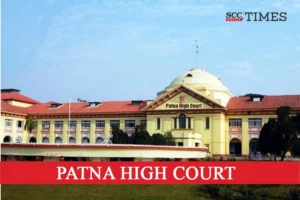Patna High Court: The present writ petition was filed by a lawyer alleging that Sections 2, 9, 12 and 18 of the Constitution (101st Amendment) Act, 2016 (‘the Amendment Act’) violated the basic structure of the Constitution and hence, was invalid, void, and unconstitutional. The Division Bench of K. Vinod Chandran, CJ.*, and Harish Kumar, J., opined that a writ petition under Article 226 of the Constitution, was maintainable either for the purpose of enforcing a statutory or legal right or with respect to breach of statutory duty on the part of the authorities and petitioner had no enforceable right judicially recognized, insofar as the Amendment Act was concerned and he did not claim any prejudice having been caused to him. The Court thus dismissed the writ petition and refrained from imposing cost as the writ petition was filed due to misguided over enthusiasm of petitioner.
Background
Petitioner submitted that the Parliament acting on the recommendations of a Goods and Services Tax Council (‘GST Council’), was an abdication of legislative functions. Respondents submitted that massive exercise was undertaken to shift to the GST regime and the levy of indirect taxes till then conferred on the State having been taken over by the Union Parliament for purposes of bringing out a unified law for levy of taxes on goods and services. It was thus, the Council was constituted with the Union Finance Minister as its Chairperson and the Union Minister of State, Incharge of Revenue or Finance and the Ministers Incharge of Finance or Taxation or any other Ministers nominated by each State Government, as members.
Respondent thus submitted that there was no abdication of the legislative functions merely because the recommendations were called for from the Council, which looked into the pan India grievances and those unique to each of the States; all of whom were represented in the Council. The Council also looked at the apportionment of tax collected between the Union and the States, for which again law had to be made by the Union Parliament and not the GST Council.
Analysis, Law, and Decision
The Court relied on Ayaaubkhan Noorkhan Pathan v. State of Maharashtra, (2013) 4 SCC 465, wherein the Supreme Court held that “a stranger cannot be permitted to meddle in any legal proceeding unless he satisfies the authority or court that he falls within the category of an aggrieved person”. The Court opined that petitioner did not suffer any legal injury by the Amendment Act, especially since he was not a person involved in commercial activities. The Court also opined that petitioner also did not have a case that he was registered under the GST enactments, and he did not even have a ground of any prejudice having been caused to him by the mechanism of reverse charge under the GST regime.
The Court opined that a writ petition under Article 226 of the Constitution, was maintainable either for the purpose of enforcing a statutory or legal right or with respect to breach of statutory duty on the part of the authorities and petitioner had no enforceable right judicially recognized, insofar as the Amendment Act was concerned and he did not claim any prejudice having been caused to him.
The Court opined that the public interest asserted could not also be entertained since the dealers registered under the earlier value added tax regime, now shifted to the GST regime, by virtue of the Amendment Act could not be said to be a marginalized section, who were incapable of agitating their rights before the courts of law.
The Court dismissed the writ petition and refrained from imposing cost as the writ petition was filed due to misguided over enthusiasm of petitioner. However, the Court cautioned petitioner from further actions of the same nature.
[Amit Pandey v. Union of India, 2024 SCC OnLine Pat 775, decided on 1-4-2024]
*Judgment authored by: Chief Justice K. Vinod Chandran
Advocates who appeared in this case :
For the Petitioner: Ashwini Kumar, Raj Kumar, M. Alam, Modassir Raza, Advocates; Amit Pandey, In Person
For the Respondents: K.N. Singh, ASG; Alok Kumar, CGC; Kanak Verma, Anshuman Singh, Advocates

